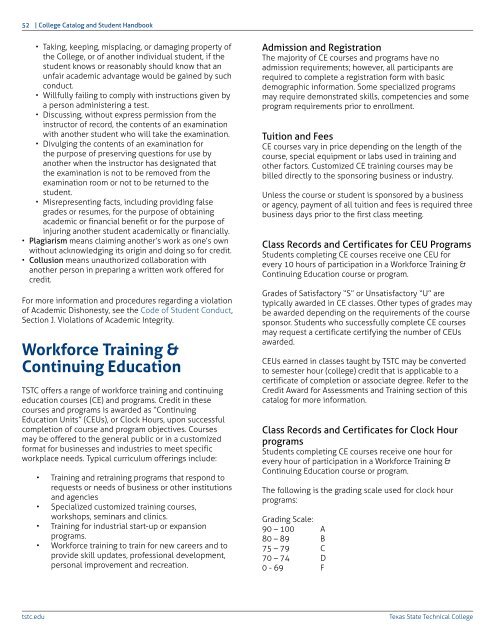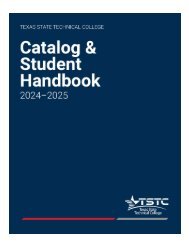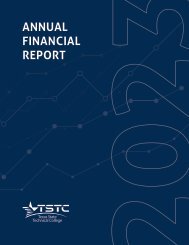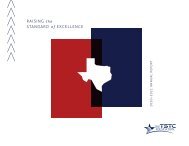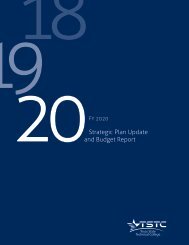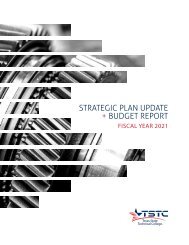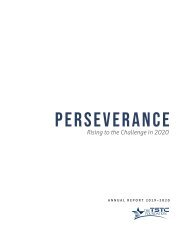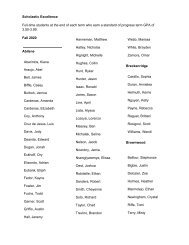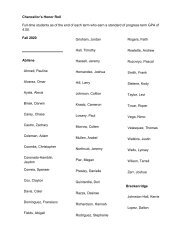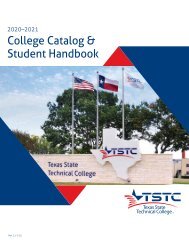Student Handbook and Catalog 2021-22 V2
Create successful ePaper yourself
Turn your PDF publications into a flip-book with our unique Google optimized e-Paper software.
52 | College <strong>Catalog</strong> <strong>and</strong> <strong>Student</strong> <strong>H<strong>and</strong>book</strong><br />
• Taking, keeping, misplacing, or damaging property of<br />
the College, or of another individual student, if the<br />
student knows or reasonably should know that an<br />
unfair academic advantage would be gained by such<br />
conduct.<br />
• Willfully failing to comply with instructions given by<br />
a person administering a test.<br />
• Discussing, without express permission from the<br />
instructor of record, the contents of an examination<br />
with another student who will take the examination.<br />
• Divulging the contents of an examination for<br />
the purpose of preserving questions for use by<br />
another when the instructor has designated that<br />
the examination is not to be removed from the<br />
examination room or not to be returned to the<br />
student.<br />
• Misrepresenting facts, including providing false<br />
grades or resumes, for the purpose of obtaining<br />
academic or financial benefit or for the purpose of<br />
injuring another student academically or financially.<br />
• Plagiarism means claiming another’s work as one’s own<br />
without acknowledging its origin <strong>and</strong> doing so for credit.<br />
• Collusion means unauthorized collaboration with<br />
another person in preparing a written work offered for<br />
credit.<br />
For more information <strong>and</strong> procedures regarding a violation<br />
of Academic Dishonesty, see the Code of <strong>Student</strong> Conduct,<br />
Section J. Violations of Academic Integrity.<br />
Workforce Training &<br />
Continuing Education<br />
TSTC offers a range of workforce training <strong>and</strong> continuing<br />
education courses (CE) <strong>and</strong> programs. Credit in these<br />
courses <strong>and</strong> programs is awarded as “Continuing<br />
Education Units” (CEUs), or Clock Hours, upon successful<br />
completion of course <strong>and</strong> program objectives. Courses<br />
may be offered to the general public or in a customized<br />
format for businesses <strong>and</strong> industries to meet specific<br />
workplace needs. Typical curriculum offerings include:<br />
• Training <strong>and</strong> retraining programs that respond to<br />
requests or needs of business or other institutions<br />
<strong>and</strong> agencies<br />
• Specialized customized training courses,<br />
workshops, seminars <strong>and</strong> clinics.<br />
• Training for industrial start-up or expansion<br />
programs.<br />
• Workforce training to train for new careers <strong>and</strong> to<br />
provide skill updates, professional development,<br />
personal improvement <strong>and</strong> recreation.<br />
Admission <strong>and</strong> Registration<br />
The majority of CE courses <strong>and</strong> programs have no<br />
admission requirements; however, all participants are<br />
required to complete a registration form with basic<br />
demographic information. Some specialized programs<br />
may require demonstrated skills, competencies <strong>and</strong> some<br />
program requirements prior to enrollment.<br />
Tuition <strong>and</strong> Fees<br />
CE courses vary in price depending on the length of the<br />
course, special equipment or labs used in training <strong>and</strong><br />
other factors. Customized CE training courses may be<br />
billed directly to the sponsoring business or industry.<br />
Unless the course or student is sponsored by a business<br />
or agency, payment of all tuition <strong>and</strong> fees is required three<br />
business days prior to the first class meeting.<br />
Class Records <strong>and</strong> Certificates for CEU Programs<br />
<strong>Student</strong>s completing CE courses receive one CEU for<br />
every 10 hours of participation in a Workforce Training &<br />
Continuing Education course or program.<br />
Grades of Satisfactory “S” or Unsatisfactory “U” are<br />
typically awarded in CE classes. Other types of grades may<br />
be awarded depending on the requirements of the course<br />
sponsor. <strong>Student</strong>s who successfully complete CE courses<br />
may request a certificate certifying the number of CEUs<br />
awarded.<br />
CEUs earned in classes taught by TSTC may be converted<br />
to semester hour (college) credit that is applicable to a<br />
certificate of completion or associate degree. Refer to the<br />
Credit Award for Assessments <strong>and</strong> Training section of this<br />
catalog for more information.<br />
Class Records <strong>and</strong> Certificates for Clock Hour<br />
programs<br />
<strong>Student</strong>s completing CE courses receive one hour for<br />
every hour of participation in a Workforce Training &<br />
Continuing Education course or program.<br />
The following is the grading scale used for clock hour<br />
programs:<br />
Grading Scale:<br />
90 – 100 A<br />
80 – 89 B<br />
75 – 79 C<br />
70 – 74 D<br />
0 - 69 F<br />
tstc.edu<br />
Texas State Technical College


